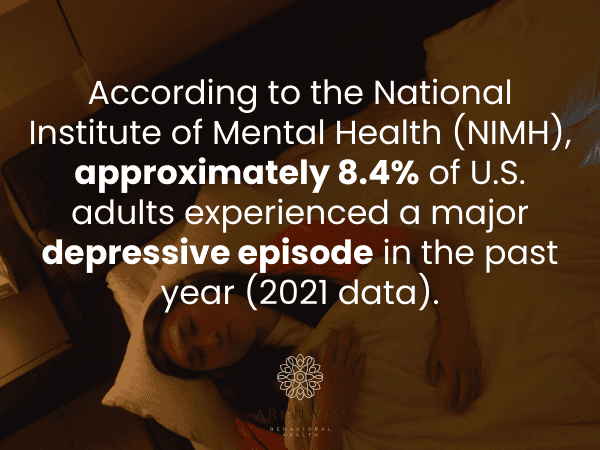Major Depressive Disorder (MDD), commonly referred to as clinical depression, is a pervasive and disabling mental health condition affecting millions of people around the world. People with MDD often experience prolonged periods of sadness, hopelessness, and a general lack of interest or pleasure in everyday activities. This condition is more than just feeling down; it’s a severe mood disorder that can interfere with a person’s ability to function in daily life, affecting their relationships, work, and overall well-being.
At Archway Behavioral Health, we understand how challenging it can be to live with MDD. That’s why we offer a wide range of mental health treatment services tailored to the specific needs of each individual. Through personalized therapy, medication management, and supportive group therapies, we aim to help individuals suffering from depression regain control of their lives and find lasting recovery. Let’s explore the symptoms, causes, and effective treatments for Major Depressive Disorder.
What is Major Depressive Disorder (MDD)?
Major Depressive Disorder is a serious mental health condition that can impact how a person thinks, feels, and acts. People with MDD may experience persistent feelings of sadness, fatigue, and a lack of interest in the activities they once enjoyed. These symptoms may last for weeks, months, or even years, significantly affecting the quality of life.
Key Symptoms of Major Depressive Disorder (MDD)
Major Depressive Disorder (MDD) manifests in a variety of symptoms that can significantly affect a person’s ability to function in everyday life. Understanding these symptoms is crucial for early detection and intervention. Some of the key symptoms of MDD include:
- Persistent Sadness: A pervasive feeling of emptiness or sadness lasting for most of the day, nearly every day.
- Loss of Interest or Pleasure: A marked reduction in interest or pleasure in all or most daily activities, including hobbies, work, and social events.
- Fatigue or Lack of Energy: Persistent feelings of exhaustion, even after rest, making it difficult to complete tasks or enjoy activities.
- Sleep Disturbances: Difficulty sleeping (insomnia) or sleeping excessively (hypersomnia).
- Appetite or Weight Changes: Significant weight loss or gain due to changes in appetite. Individuals may either lose interest in food or turn to food for comfort.
- Feelings of Worthlessness or Guilt: A persistent sense of being unworthy or excessive guilt for events outside one’s control.
- Difficulty Concentrating: Problems focusing, making decisions, or remembering details.
- Thoughts of Death or Suicide: In some cases, individuals may experience suicidal thoughts or a preoccupation with death, which requires immediate professional intervention.
Diagnosing Major Depressive Disorder
Accurate diagnosis of Major Depressive Disorder is essential for effective treatment. Mental health professionals at Archway Behavioral Health utilize a thorough assessment process, which includes reviewing the individual’s symptoms, medical history, and the impact the symptoms have on their daily life. Diagnosis is typically based on the criteria outlined in the Diagnostic and Statistical Manual of Mental Disorders (DSM-5), which helps clinicians identify the severity and duration of the symptoms.
While MDD can be triggered by various factors, including genetics, brain chemistry, trauma, and life stressors, it is often a combination of multiple elements that contribute to its development. This complexity necessitates a comprehensive, multi-faceted approach to treatment.

Different Types of Major Depressive Disorder (MDD)
Major Depressive Disorder is not a one-size-fits-all diagnosis. There are several types of MDD, each with its own set of features and characteristics. These include:
- Melancholic Depression: This type of MDD is marked by a profound lack of pleasure in most activities and may include extreme weight loss, insomnia, and excessive guilt.
- Atypical Depression: People with atypical depression may experience mood reactivity (i.e., feeling better after positive events), weight gain, and increased sleep, but still experience other depressive symptoms.
- Psychotic Depression: This type of depression is accompanied by psychosis, such as hallucinations or delusions, in addition to the usual depressive symptoms.
- Seasonal Affective Disorder (SAD): This type of depression occurs seasonally, typically in the winter months, and is believed to be related to reduced sunlight exposure.
- Postpartum Depression: Occurring in women after childbirth, this form of depression involves symptoms like extreme sadness, fatigue, and anxiety, making it difficult to bond with the baby.
- Chronic Depression (Dysthymia): A less intense but long-lasting form of depression that can persist for at least two years, affecting one’s ability to function normally.
Possible Causes of Major Depressive Disorder (MDD)
The causes of Major Depressive Disorder are complex and can vary from person to person. A combination of biological, environmental, and psychological factors typically contribute to its development. Some possible causes include:
- Genetics: A family history of depression increases the risk of developing MDD. Specific genes may also play a role in the condition.
- Brain Chemistry: Imbalances in neurotransmitters, chemicals that regulate mood, such as serotonin, dopamine, and norepinephrine, may contribute to depression.
- Hormonal Changes: Changes in hormones due to pregnancy, childbirth, menopause, or thyroid problems can trigger depression.
- Trauma and Stress: Childhood trauma, abuse, and ongoing stressors, such as financial problems or the death of a loved one, can increase the risk of depression.
- Chronic Illness: Conditions like diabetes, heart disease, and chronic pain disorders may contribute to feelings of sadness or hopelessness.
- Substance Abuse: Alcohol or drug abuse can lead to or worsen depressive symptoms.
Stages and Severity of Major Depressive Disorder (MDD)
Major Depressive Disorder can present itself in varying stages of severity, each requiring a different level of intervention. Understanding the stages and severity of depression is essential for determining the most appropriate treatment plan. The stages of MDD include:
- Mild Depression: Individuals may experience some symptoms of depression but can still function in daily life. The symptoms may not be as intense, but they can interfere with one’s enjoyment of life.
- Moderate Depression: At this stage, symptoms become more pronounced and affect a person’s ability to carry out normal tasks. Individuals may have difficulty keeping up with work or social obligations.
- Severe Depression: Symptoms of severe depression can make it impossible for individuals to function normally. This may include suicidal thoughts, inability to perform basic self-care, and a deep sense of hopelessness. Professional treatment is necessary for this stage.
- Chronic Depression (Dysthymia): Chronic depression persists for at least two years and can fluctuate in severity. People with chronic depression may experience periods of more severe symptoms followed by periods of relative improvement.
The Importance of a Comprehensive Treatment Plan for MDD
The path to recovery from Major Depressive Disorder often involves a combination of therapeutic techniques, medication, and lifestyle changes. At Archway Behavioral Health, we offer a range of treatment options to address the unique needs of each individual, taking into account their specific symptoms, background, and preferences. We believe in a holistic, individualized approach that incorporates evidence-based therapies, medical support, and lifestyle improvements.
1. One-on-One Therapy
Personalized one-on-one therapy is the cornerstone of our approach to treating depression. Working directly with a licensed therapist, individuals can explore the underlying causes of their depression, identify negative thought patterns, and develop coping strategies. This therapeutic relationship provides a safe and confidential space to address personal issues that may be contributing to their mental health struggles.
2. Cognitive Behavioral Therapy (CBT)
CBT is one of the most effective therapies for treating MDD. It focuses on identifying and changing negative thinking patterns that contribute to depressive symptoms. CBT helps individuals challenge irrational beliefs, reframe negative thoughts, and build healthier thought processes that lead to improved mood and behavior.
3. Dialectical Behavior Therapy (DBT)
For individuals struggling with intense emotions, DBT can be an especially helpful treatment. This therapy teaches clients how to regulate their emotions, improve interpersonal relationships, and reduce self-destructive behaviors. It is particularly effective for individuals with mood disorders, including depression, that are marked by emotional instability and impulsivity.
4. Group Therapy Program
Group therapy provides a supportive environment where individuals with similar experiences can come together, share their struggles, and learn from one another. This therapy format not only helps reduce feelings of isolation but also provides a sense of community and support that can significantly aid in the recovery process.
5. Trauma Treatment Program
For some individuals, depression is rooted in unresolved trauma. Our trauma treatment program focuses on healing from past traumatic events, whether they are related to childhood abuse, loss, or other life-altering experiences. Addressing trauma is crucial for individuals whose depression is closely linked to these underlying emotional wounds.
6. Intensive Outpatient Program (IOP) and Partial Hospitalization Program (PHP)
For those needing more intensive support, our Intensive Outpatient Program (IOP) and Partial Hospitalization Program (PHP) offer structured care while allowing individuals to live at home. These programs provide a combination of therapy, medication management, and life skills training to help individuals manage their symptoms and make steady progress toward recovery.
The Benefits of Seeking Treatment for Major Depressive Disorder
The treatment of Major Depressive Disorder offers numerous benefits, not only for emotional well-being but also for physical and social health. Individuals who seek treatment for MDD can experience:
- Improved Emotional Stability: Through therapy and medication, individuals can regulate their moods and gain a greater sense of emotional control.
- Better Social Relationships: As depression symptoms improve, individuals can reconnect with loved ones, restore personal relationships, and reduce isolation.
- Enhanced Productivity: By improving mental clarity and motivation, treatment for depression allows individuals to regain their focus and energy, improving their ability to work and perform everyday tasks.
- Improved Physical Health: Depression has been linked to physical conditions like chronic pain, digestive issues, and cardiovascular disease. By addressing depression, individuals may also experience improved physical health.
- Reduced Suicide Risk: Timely treatment can significantly reduce the risk of suicidal thoughts and behaviors, improving safety and mental health outcomes.
Why Choose Archway Behavioral Health for Depression Treatment?
At Archway Behavioral Health, we are committed to providing compassionate, effective care for individuals struggling with Major Depressive Disorder. Our comprehensive, evidence-based approach ensures that each person receives the support and treatment they need to heal. With programs like CBT, DBT, and specialized trauma treatment, we can help individuals address the underlying causes of their depression and build a foundation for long-term recovery.
Our goal is to provide the mental health treatment services that will empower individuals to live fuller, healthier lives. Whether you are seeking individual therapy, a group therapy program, or a partial hospitalization program, we are here to guide you through every step of your recovery.
Final Thoughts
Major Depressive Disorder is a treatable condition, and with the right support, recovery is possible. If you or someone you know is struggling with depression, don’t wait to seek help. Archway Behavioral Health is here to help you navigate the journey toward healing and recovery. Reach out today to begin your path to mental wellness.
Frequently Asked Questions (FAQ)
What is the difference between Major Depressive Disorder and temporary sadness?
While everyone experiences sadness or grief at times, MDD is more persistent, lasting for at least two weeks or more, and often interferes with day-to-day activities. It also includes a range of physical symptoms such as fatigue, changes in appetite, and sleep disturbances.
How is Major Depressive Disorder diagnosed?
Diagnosis is typically made by a mental health professional who conducts a thorough assessment, which includes evaluating the individual’s symptoms, medical history, and any potential contributing factors. The clinician will use criteria from the DSM-5 to make a formal diagnosis.
Can MDD be treated without medication?
Yes, treatment for MDD often involves psychotherapy (such as Cognitive Behavioral Therapy (CBT) or Dialectical Behavior Therapy (DBT)), along with lifestyle changes. For some people, therapy is sufficient, while others may require medication as part of a comprehensive treatment plan.
What should I do if I have thoughts of suicide?
If you are experiencing suicidal thoughts, it is crucial to seek immediate help from a healthcare provider, therapist, or counselor. Support from loved ones and professional intervention can make a significant difference in preventing self-harm.


